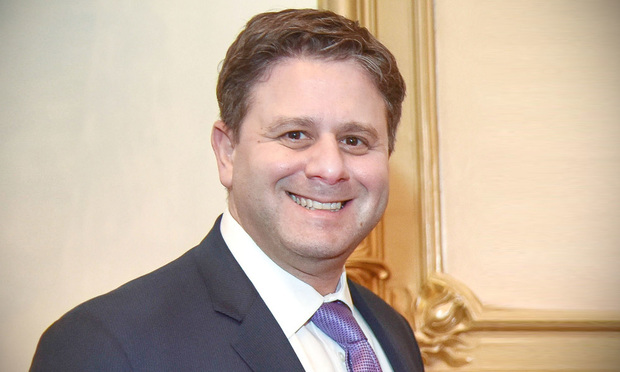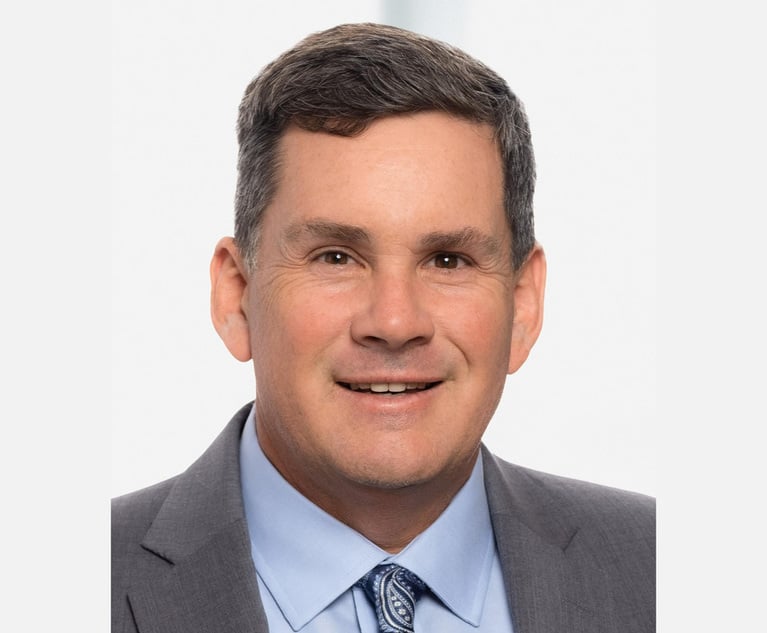NY Trial Lawyers Decry SCOTUS Decision Allowing Contracts Banning Class Actions
The New York Law Journal asked Matt Funk, president of the New York State Trial Lawyers Association and is a senior partner at Pasternack Tilker Ziegler Walsh Stanton & Romano, to share his opinions on the U.S. Supreme Court's recent decision on employment contracts and new laws on sexual harassment and scaffold protection.
May 29, 2018 at 11:48 AM
6 minute read
 New York State Trial Lawyers Association President Matt Funk (Photo by David Handschuh/NYLJ)
New York State Trial Lawyers Association President Matt Funk (Photo by David Handschuh/NYLJ)
Matt Funk is the president of the New York State Trial Lawyers Association and is a senior partner at Pasternack Tilker Ziegler Walsh Stanton & Romano. The New York Law Journal asked Funk to share his opinions on the U.S. Supreme Court's recent decision on employment contracts and new laws on sexual harassment and scaffold protection.
Q: Do you think the Supreme Court's recent decision that employment agreements that ban class actions do not violate federal labor laws will have an impact on workers?
A: The Supreme Court decision is a blatant misinterpretation of labor rights that will ultimately harm workers across the country. Individual workers typically lack the resources to take on major corporations by themselves. Through class-action lawsuits, workers can join together to hold negligent employers and bad actors accountable.
By allowing employers to strip this fundamental right away from workers, the Supreme Court is forcing victims to take reported violations to paid third-party arbitrators, usually from an arbitration firm chosen by the employer, which creates a strong potential for bias. It removes the dispute-resolution mechanism from an independent court, and places it into the hands of decision-makers in the pockets of the accused party, making it difficult to hold employers responsible for misconduct and labor violations.
Q: When did mandatory arbitration clauses really become so entrenched in the agreements and contracts that consumers regularly encounter?
A: Mandatory arbitration clauses have their roots in the Federal Arbitration Act, a law passed in 1925 that granted businesses the ability to resolve disputes outside of the courtroom through third-party arbitrators. The law was designed for business-to-business transactions but over the past 30 to 40 years, the courts have made it easier for corporations to include these clauses in contracts where the individual consumer or employee has no real power to change the contract terms. Eventually, these clauses became par for the course, often cloaked in legalese unrecognizable to the untrained eye.
Consumers often overlook these clauses, unaware of how their rights are being limited until it's too late to avoid them or take action. The only way to level the playing field, and make sure corporations take consumer safety seriously, is to ban mandatory arbitration clauses in employment and consumer contracts.
Q: What is the association's reaction to recent sexual harassment legislation passed and signed into law in New York City?
A: The legislation is a major step in the right direction, at a critical moment in the fight for gender equality. Over the past year, women across the country have shared their experiences in the workplace, demonstrating how institutions have reinforced sexism to physically harm and intimidate women, discourage their ambitions, prevent career advancement, and create hostile workplaces.
The City Council recognized that it was imperative to do more than just listen—they needed to act and do something to change the status quo. The legislation will help ensure that all managers and employees are properly trained and educated, creating a foundation for institutional reform that reverberates across businesses and organizations of all stripes in New York City.
Q: I know the association has taken a position on the Scaffold Safety Law in New York. What are the concerns?
A: It's no secret that construction work is one of the most dangerous jobs in New York. In 2016 alone, 71 construction workers in New York State died in on-the-job incidents, the highest total we've seen since 2002. The Scaffold Safety Law is a much-needed source of justice and accountability that is essential to protecting workers and making safety paramount.
Given the risks involved, it's up to owners and general contractors who have ultimate control over the work site to create a secure working environment, by following safety guidelines and providing proper equipment. When owners and general contractors ignore basic rules and fail to provide adequate gear, they put workers at risk and create tragedies out of sheer negligence and disregard for their employees' lives.
The Scaffold Safety Law offers workers and their families a way to hold negligent owners and general contractors accountable. In instances where workers are seriously injured or killed as a result of unsafe working conditions, their families are forced to take on the costs of lost wages, medical bills and other impacts that are not adequately covered by workers' compensation, not to mention the physical and emotional pain that results. The Scaffold Safety Law can help mitigate the financial stresses and devastation facing victims and their families, while delivering them justice. At the same time, it insists that owners and contractors follow safety guidelines and promote worker safety so workers can return home to their families at the end of a hard day's work.
Q: You're nearing the end of your term as NYSTLA president. What achievements are you most proud of?
A: Over the last year, I'm particularly proud of NYSTLA's leadership in expanding and strengthening the legal rights of everyday New Yorkers. Working with a broad network of affected residents and families, advocates, and legislators, NYSTLA has been able to achieve legislative and regulatory victories that deliver justice and practical, meaningful results.
In January, Lavern's Law was enacted, establishing legal rights for patients harmed by negligent failure to diagnose cancer or a malignant tumor by changing the statute of limitations to reflect the date of discovery. And in 2017, legislation was passed that expands access to SUM auto insurance, promoting better insurance coverage for drivers. Elsewhere on the road, we successfully fought for the implementation of a regulatory framework for ride-share services that is the best in the nation when it comes to protecting consumers, including proper insurance coverage. Not to be forgotten, we also reinforced victims' legal rights through a bill that allows lawsuits to proceed in the same county where the violation occurred. And, finally, as a workers' compensation attorney, I am particularly proud of our success working with the labor movement to beat back harmful changes that were proposed that would have gutted the workers' compensation system.
At the same time, NYSTLA has continued to help young lawyers develop professionally and gain the knowledge they need to make a significant impact through a continuing legal education program that has repeatedly been voted the best in the state.
We believe in leading by example, and our efforts this year serve as a reminder of how the legal community can make a difference on behalf of the public interest.
This content has been archived. It is available through our partners, LexisNexis® and Bloomberg Law.
To view this content, please continue to their sites.
Not a Lexis Subscriber?
Subscribe Now
Not a Bloomberg Law Subscriber?
Subscribe Now
NOT FOR REPRINT
© 2025 ALM Global, LLC, All Rights Reserved. Request academic re-use from www.copyright.com. All other uses, submit a request to [email protected]. For more information visit Asset & Logo Licensing.
You Might Like
View All
Labaton’s Eric Belfi on Running Case Investigation, Analysis and Delaware Presence

Litigation Leaders: Quinn Emanuel's Michael Carlinsky on Training Associates to Think and Act Like Trial Lawyers

Innovation Award Individual Finalist: Charlie Hernandez, My Pocket Lawyer
1 minute read
Trending Stories
- 1New York-Based Skadden Team Joins White & Case Group in Mexico City for Citigroup Demerger
- 2No Two Wildfires Alike: Lawyers Take Different Legal Strategies in California
- 3Poop-Themed Dog Toy OK as Parody, but Still Tarnished Jack Daniel’s Brand, Court Says
- 4Meet the New President of NY's Association of Trial Court Jurists
- 5Lawyers' Phones Are Ringing: What Should Employers Do If ICE Raids Their Business?
Who Got The Work
J. Brugh Lower of Gibbons has entered an appearance for industrial equipment supplier Devco Corporation in a pending trademark infringement lawsuit. The suit, accusing the defendant of selling knock-off Graco products, was filed Dec. 18 in New Jersey District Court by Rivkin Radler on behalf of Graco Inc. and Graco Minnesota. The case, assigned to U.S. District Judge Zahid N. Quraishi, is 3:24-cv-11294, Graco Inc. et al v. Devco Corporation.
Who Got The Work
Rebecca Maller-Stein and Kent A. Yalowitz of Arnold & Porter Kaye Scholer have entered their appearances for Hanaco Venture Capital and its executives, Lior Prosor and David Frankel, in a pending securities lawsuit. The action, filed on Dec. 24 in New York Southern District Court by Zell, Aron & Co. on behalf of Goldeneye Advisors, accuses the defendants of negligently and fraudulently managing the plaintiff's $1 million investment. The case, assigned to U.S. District Judge Vernon S. Broderick, is 1:24-cv-09918, Goldeneye Advisors, LLC v. Hanaco Venture Capital, Ltd. et al.
Who Got The Work
Attorneys from A&O Shearman has stepped in as defense counsel for Toronto-Dominion Bank and other defendants in a pending securities class action. The suit, filed Dec. 11 in New York Southern District Court by Bleichmar Fonti & Auld, accuses the defendants of concealing the bank's 'pervasive' deficiencies in regards to its compliance with the Bank Secrecy Act and the quality of its anti-money laundering controls. The case, assigned to U.S. District Judge Arun Subramanian, is 1:24-cv-09445, Gonzalez v. The Toronto-Dominion Bank et al.
Who Got The Work
Crown Castle International, a Pennsylvania company providing shared communications infrastructure, has turned to Luke D. Wolf of Gordon Rees Scully Mansukhani to fend off a pending breach-of-contract lawsuit. The court action, filed Nov. 25 in Michigan Eastern District Court by Hooper Hathaway PC on behalf of The Town Residences LLC, accuses Crown Castle of failing to transfer approximately $30,000 in utility payments from T-Mobile in breach of a roof-top lease and assignment agreement. The case, assigned to U.S. District Judge Susan K. Declercq, is 2:24-cv-13131, The Town Residences LLC v. T-Mobile US, Inc. et al.
Who Got The Work
Wilfred P. Coronato and Daniel M. Schwartz of McCarter & English have stepped in as defense counsel to Electrolux Home Products Inc. in a pending product liability lawsuit. The court action, filed Nov. 26 in New York Eastern District Court by Poulos Lopiccolo PC and Nagel Rice LLP on behalf of David Stern, alleges that the defendant's refrigerators’ drawers and shelving repeatedly break and fall apart within months after purchase. The case, assigned to U.S. District Judge Joan M. Azrack, is 2:24-cv-08204, Stern v. Electrolux Home Products, Inc.
Featured Firms
Law Offices of Gary Martin Hays & Associates, P.C.
(470) 294-1674
Law Offices of Mark E. Salomone
(857) 444-6468
Smith & Hassler
(713) 739-1250






